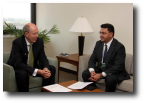Washington D.C., 27th April (MIA) – International Monetary Fund and World Bank gave positive remarks for the 2009 Supplementary Budget which the Government prepared, according to which expenditures are rationalized and set of anti-crisis measures is adopted.

Washington D.C., 27th April (MIA) – International Monetary Fund and World Bank gave positive remarks for the 2009 Supplementary Budget which the Government prepared, according to which expenditures are rationalized and set of anti-crisis measures is adopted.
According to the representatives of these international financial institutions, which Vice Prime Minister Zoran Stavreski and Minister of Finance Trajko Slaveski met this weekend in Washington D.C., Macedonia is on the right path and manages the crisis well.
– This speaks in favour that the support to the economic activity through infrastructure projects is the advice the international financial institutions would have given. Now, we have to await the development of the balance of payments during the year, but in the meantime we will continue our discussions with both the IMF and the World Bank.
Both institutions remain open for cooperation with Macedonia and we can rely on them at any time, for the policies we implement and the overall performance so far speak of Macedonia as a country capable to control the situation and holding relatively better position in relation to the other countries facing bigger problems with the crisis, Vice Prime Minister Stavreski said after the meetings he and Minister Slaveski had during IMF/World Bank Spring Meetings in Washington D.C.
He, as MIA reporter informs, said that the Government will remain further engaged in monitoring the budget performance and fully committed for the budget deficit to remain within the 2.8%, thus underpinning the stability of the exchange rate.
International Monetary Fund, as Minister Slaveski said, does not object the 2.8% budget deficit, as it did in September, since the IMF believes that it is a legitimate right for a country experiencing consequences from the economic crisis to face budget deficit.
He stated that with respect to financing the budget deficit, which in the case of the Republic of Macedonia is more related to infrastructure projects, the Government tries to come up with a sustainable package which, at this time, does not envisage conclusion of an arrangement with the IMF.
– We have made all necessary preparations, and some issues have been discussed here as well. In the coming seven to eight weeks, we expect to ensure EUR 150 to 200 million on the private markets by issuing Eurobond at price at which the Government ensures funds for its needs on the domestic market, i.e. 9-10% interest, Minister Slaveski pointed out, welcoming the initiatives from IMF, World Bank and other institutions aimed at support to the countries, i.e. facilitation of crediting requirements.
He also mentioned the possibility for the countries to use around 77% of their quota in the IMF without any conditionality, something to be confirmed by the American Congress this summer and the resources would be available by autumn this year.
As Minister Slaveski said, there is a possibility to obtain funds as budget support form the World Bank as well. It is smaller amount of funds, for the usage of which, as the Minister said, there are different opinions on whether it should be conditioned with an IMF arrangement.
– There are divided opinions, and our position is since there is legitimacy for the countries to experience budget deficit and have need to finance it, this should not be conditioned with an arrangement. Positive assessment of Government policies by the IMF should be sufficient, which I think we will obtain during the upcoming visit of IMF representatives in the period 7-14 May this year, Slaveski said.
Starting point on the discussions with IMF and WB representatives was the well-known IMF recommendation to all countries to use 2% of GDP as fiscal stimulus so as to exit the crisis, which, as the Minister says, is reflected on the budget deficit.
– If this is what the IMF recommend, then we are at the position that no conditions should be posed on how the country will provide these funds, but each institution should rather, within its possibilities and procedures, provide cheap funds, Minister of Finance said, adding that the Government intends to ensure sources of funds on the international capital market as well.
– We believe the funds from the European Investment Bank for the Republic of Macedonia, the possibility to use funds from the IMF quota up to around US$ 77 million and the possible US$ 50 million in the coming two years from the World Bank, which would be sufficient, should be provided for meeting the needs to finance the budget deficit, Minister Trajko Slaveski explained.
Minister Slaveski also met representatives from the IMF Fiscal Affairs Department, with which the Republic of Macedonia has many-year cooperation, which evaluated as successful the project for integrated collection of contributions and personal income tax, together with the introduction of the gross salary concept.
As Minister Slaveski said, IMF Fiscal Affairs Department pointed out that they prepare a case study for the introduction of this concept in the Republic of Macedonia, to serve as an example to the other countries.
###














